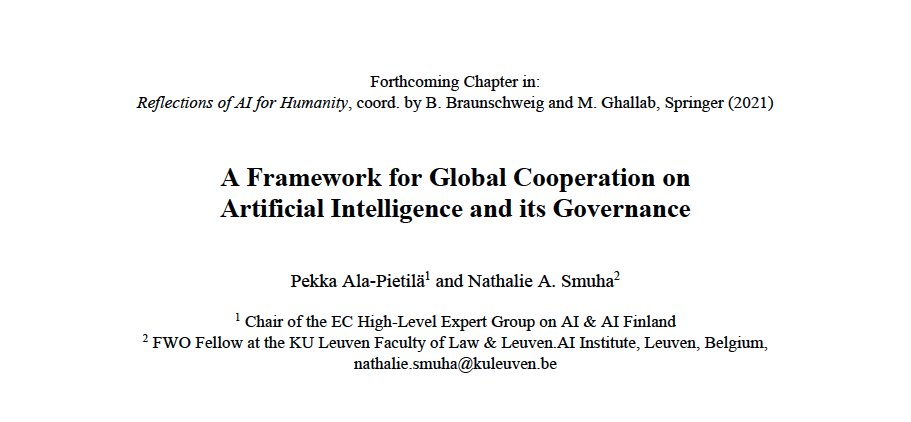New article out - written with @p_alapietila - in which we put forward a comprehensive framework for Global Cooperation on #AI & its #Governance, focusing on the Why, What and How of global cooperation.
Preprint here: https://papers.ssrn.com/sol3/papers.cfm?abstract_id=3696519.
Main">https://papers.ssrn.com/sol3/pape... points in thread https://abs.twimg.com/emoji/v2/... draggable="false" alt="👇" title="Rückhand Zeigefinger nach unten" aria-label="Emoji: Rückhand Zeigefinger nach unten">(1/12)
https://abs.twimg.com/emoji/v2/... draggable="false" alt="👇" title="Rückhand Zeigefinger nach unten" aria-label="Emoji: Rückhand Zeigefinger nach unten">(1/12)
Preprint here: https://papers.ssrn.com/sol3/papers.cfm?abstract_id=3696519.
Main">https://papers.ssrn.com/sol3/pape... points in thread
There is a growing awareness of the need to cooperate & many initiatives took off. Why? Esp. important to shift global mindset from zero sum game / protectionist approach (with winners v. losers but in long term, everyone loses) towards infinite game (all can/should gain). (2/12)
What challenges to address? Protect citizens from AI risks across the globe & secure conditions for healthy & fair global competition, so as to enable socially beneficial AI innovation. This requires the creation of a holistic level playing field, along two dimensions: (3/12)
(a) Horizontal: common requirements must render entire socio-technical environment of AI systems trustworthy. Beyond AI systems, must also include environment of data & infrastructure. No TW system w/o TW data & TW infrastructure (= the system-data-infrastructure trinity). (4/12)
(b) Vertical: cooperation also needed on domain-specific issues in tailored way: areas/applications where AI’s benefits for humanity can be maximised (AI4Good), where there are significant risks (military, misinformation, mass surveillance) & ad hoc matters (e.g. Covid). (5/12)
As to the How of global cooperation, we have 7 points of advice (yes, we like that number :-)).
1. Holistic approach is crucial, but so is the need for speed & context-specificity. These 3 aspects are not always in harmony and must be balanced depending on issue at stake; (6/12)
1. Holistic approach is crucial, but so is the need for speed & context-specificity. These 3 aspects are not always in harmony and must be balanced depending on issue at stake; (6/12)
2. The rules of engagement amongst cooperation partners must be clarified in advance, especially when they compete with each other on values rather than (only) on markets; (7/12)
3. Cooperation via existing fora is to be favored over creating new ones, unless justification;
4. When cooperation mandates of different fora overlap they should create a network of networks to exchange knowledge & build collective wisdom (no competition -> coopetition); (8/12)
4. When cooperation mandates of different fora overlap they should create a network of networks to exchange knowledge & build collective wisdom (no competition -> coopetition); (8/12)
5. Considering models of differentiated cooperation is useful, so that cooperation partners can cooperate at different speeds based on value-alignment / shared objectives. Yet the ultimate aim should be an as broad as possible coalition; (9/12)
6. An inclusive and transparent way of working is needed amongst cooperation partners, mindful of power imbalances. Not everyone has easy access to a seat at the cooperation table, but all voices should be heard; (10/12)
7. Feedback loops are needed to improve the cooperation approach along the way, informed by science/evidence. Simultaneously, we need to prepare & empower the next generation of global cooperators through broader education on the capabilities & limitations of AI. (11/12)
Establishing meaningful global cooperation on AI & its governance is a #marathon, not a sprint. Lots of work to do, so global cooperation partners better roll up their sleeves!
For more details, read the article here: https://papers.ssrn.com/sol3/papers.cfm?abstract_id=3696519.">https://papers.ssrn.com/sol3/pape... (12/12)
For more details, read the article here: https://papers.ssrn.com/sol3/papers.cfm?abstract_id=3696519.">https://papers.ssrn.com/sol3/pape... (12/12)

 Read on Twitter
Read on Twitter (1/12)" title="New article out - written with @p_alapietila - in which we put forward a comprehensive framework for Global Cooperation on #AI & its #Governance, focusing on the Why, What and How of global cooperation. Preprint here: https://papers.ssrn.com/sol3/pape... points in threadhttps://abs.twimg.com/emoji/v2/... draggable="false" alt="👇" title="Rückhand Zeigefinger nach unten" aria-label="Emoji: Rückhand Zeigefinger nach unten">(1/12)" class="img-responsive" style="max-width:100%;"/>
(1/12)" title="New article out - written with @p_alapietila - in which we put forward a comprehensive framework for Global Cooperation on #AI & its #Governance, focusing on the Why, What and How of global cooperation. Preprint here: https://papers.ssrn.com/sol3/pape... points in threadhttps://abs.twimg.com/emoji/v2/... draggable="false" alt="👇" title="Rückhand Zeigefinger nach unten" aria-label="Emoji: Rückhand Zeigefinger nach unten">(1/12)" class="img-responsive" style="max-width:100%;"/>


